If you are looking for a gentle companion to add to your family, then the shih tzu may be the perfect pup for you! If you’re considering adopting this cute breed, you will want to know all about shih tzu progression. This breed was bred solely for the purpose of providing companionship, and they fill this role with pride. Ranging from living with kings to emperors, the shih tzu has a long history of cuddling up to those they love!
With such a long history of being a beloved family member, it’s no wonder so many people want to be shih tzu parents. We want you to know all there is to know about the shih tzu breed, so let’s dive into our detailed breed progression guide!
In this article we will discuss their growth chart by age, training tips, potential health issues, and more. Let’s get started!
Brief Shih Tzu Summary
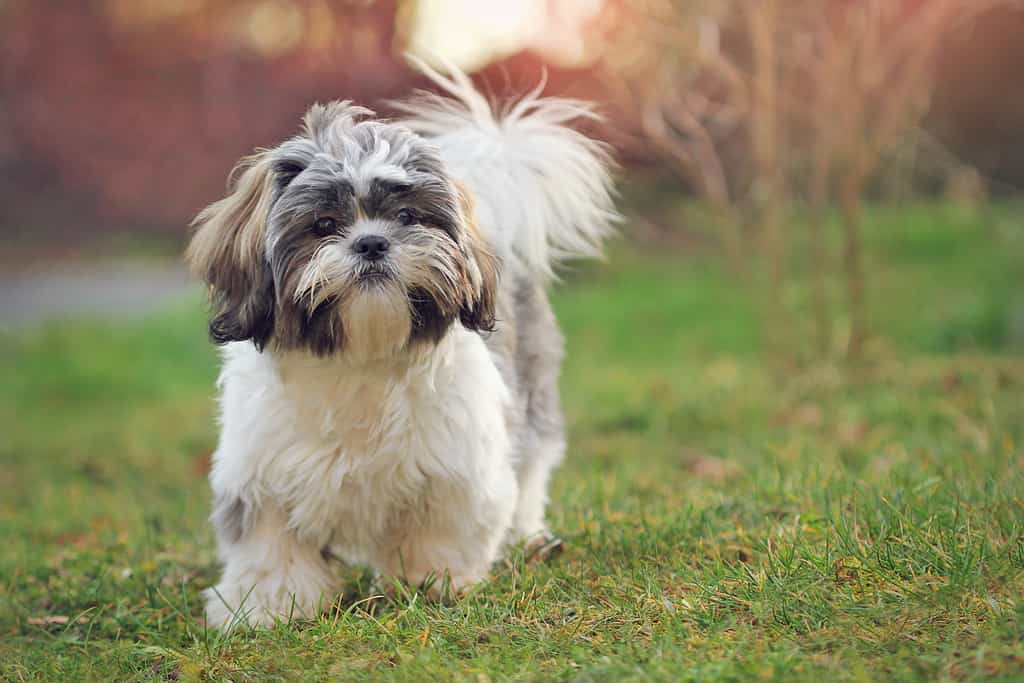
The Shih Tzu is loving, gentle, goofy, and downright adorable.
©iStock.com/elenasendler
Many dog breeds come from humble beginnings of assisting their owners on hunts or with farm work, but this is not the case for the regal shih tzu. The shih tzu’s reign spans all the way back to the Ming Dynasty, where they were once beloved pets to royal Chinese families. Their popularity now spans to every corner of the globe, but they still have that some royal look they sported years ago.
It’s no wonder so many people have fallen in love with the shih tzu breed over the years. These pups are loving, gentle, goofy, and downright adorable. They make wonderful additions to any home, even those that live in apartments. As long as your shih tzu gets to spend quality time with their family each day, they are happy!
Shih Tzu Growth and Weight Chart by Age
Shih tzu’s are considered small breed or toy breed dogs, so you do not have to expect any massive growth spurts throughout the first year of their life. However, it’s always good to have an idea of what’s ahead for your shih tzu as they grow out of puppyhood.
| Age | Male Weight | Female Weight |
|---|---|---|
| Birth | Under 1 pound | Under 1 pound |
| 1 Month | 1-1.5 pounds | 1 pound |
| 6 Weeks | 1.5-2 pounds | 1-1.5 pounds |
| 2 Months | 2-2.5 pounds | 2 pounds |
| 3 Months | 4 pounds | 2.5-3.5 pounds |
| 4 Months | 6 pounds | 4-5.5 pounds |
| 5 Months | 8 pounds | 6-7.5 pounds |
| 6 Months | 10 pounds | 8-9.5 pounds |
| 7 Months | 12 pounds | 10-11 pounds |
| 8 Months | 12.5 pounds | 10.5-11.5 pounds |
| 9 Months | 12.5 pounds | 11-12 pounds |
| 10 Months | 13 pounds | 11-12 pounds |
| 11 Months | 13 pounds | 11-12 pounds |
| 12 Months | 13 pounds | 11-12 pounds |
| 2 Years | 13-14 pounds | 11-12.5 pounds |
While the above weight ranges are an average for this breed, the best way to know your shih tzu’s eventual size is by meeting their parents!
When Will My Shih Tzu Stop Growing?
If you adopt your shih tzu when they are early in their puppyhood, you may wonder when they will stop growing and reach their adult size. Though every shih tzu can vary in size slightly, you can typically expect your shih tzu to reach their adult size by 10 months of age. Your little one may continue to fill out in the following six months, but there should be no drastic growth after the 10-month mark.
How Big Will My Shih Tzu Be When It’s Fully Grown?
The shih tzu is the perfect lap dog due to their small size and their loving personality. Since your shih tzu will surely occupy your lap or cuddle alongside you on the couch, you will want to know just how big these pups are when fully grown!
On average, most shi tzu dogs will weigh anywhere from 10-14 pounds, and they will be nine to 10 inches in height at the shoulder. Your shih tzu can fall outside of this range slightly based on their genetics, but if anything, it will be on the lower end of the scale.
When Should My Shih Tzu Stop Eating Puppy Food?
Puppy food is fortified with higher levels of calcium, phosphorus, protein, and fat, as well as a higher calorie content per cup. Your shih tzu puppy may not be putting on multiple pounds each month as they grow, but they will still need special nutrients and extra calories to help them reach adulthood.
Since the shih tzu is typically growing until they reach 10 months of age, then we always suggest offering them a puppy kibble until they reach this point. They may continue to fill out for an additional six months after this, but they no longer need the added nutrients and calories that puppy food offers. Once your shih tzu hits 10 months of age, you can transition them over to an adult dog food for small breed dogs.
When Will My Shih Tzu Start Losing Teeth?
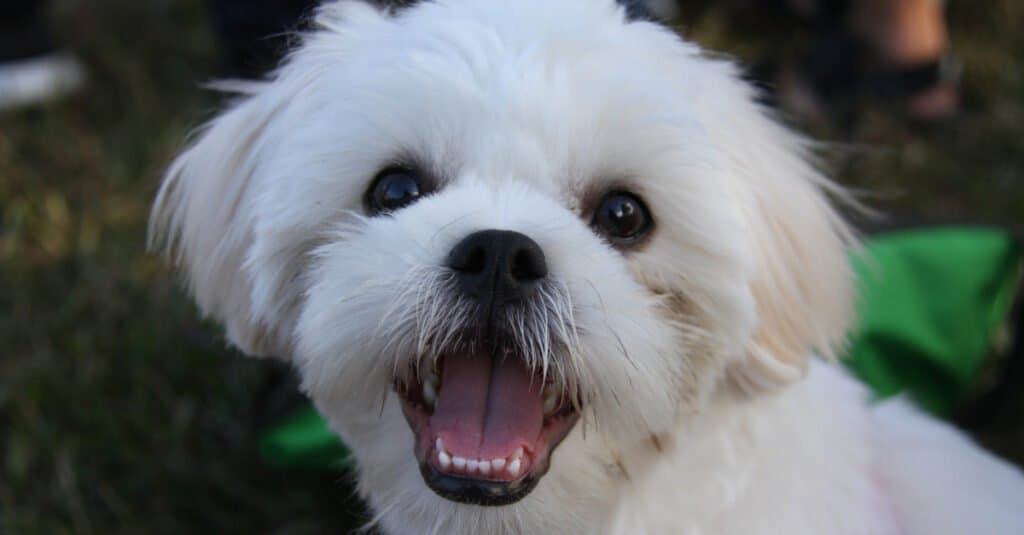
Your shih tzu puppy will be born without any teeth, but their baby teeth will start to erupt from their gums once they reach 3-4 weeks of age.
©TracyUnicorn/Shutterstock.com
Just like in humans, the shih tzu will have a set of baby teeth that fall out throughout their puppyhood. They will lose their baby teeth over a period of months rather than years, but they will still lose these temporary teeth to make room for their permanent adult teeth.
Your shih tzu puppy will be born without any teeth, but their baby teeth will start to erupt from their gums once they reach three to four weeks of age. These sharp puppy teeth will continue to grow over the next three weeks, and they should have a mouth full of puppy teeth by the time they reach six weeks of age.
Your shih tzu’s puppy teeth will stick around for the next six weeks, but once they reach 12 weeks of age, their adult teeth will begin to move toward the surface of their gums. This process will push out their baby teeth one by one, and your pup should have all of their adult teeth by the time they are six months old.
When Should I Start Training My Shih Tzu Puppy?
It’s a common misconception that toy bred dogs do not require training due to their small size, but this is not the case at all. While an untrained shih tzu may not be as dangerous as an untrained large dog, they can certainly be unruly and difficult to manage. A shih tzu without obedience training or proper socialization can be fearful, aggressive, and may display incessant barking.
Just like any other breed of dog, we always suggest training your shih tzu from the moment they enter your home. Most dogs are receptive to basic obedience training from the time they reach eight weeks of age, so you can typically begin from this point and on.
It’s also important to keep in mind that while the shih tzu is receptive to obedience training, most small breed dogs can be a bit stubborn. This means that you will need to be consistent throughout your training process, as many toy breed dogs can regress if their training is not a regular part of their routine.
What Commands Should I Teach My Shih Tzu First?
If you have never trained a canine friend before, you may be wondering what tricks you should start with on your shih tzu’s obedience training journey. The priority of these commands can vary based on what’s necessary in your home, but the following are the basic commands that we think all shih tzu dogs should learn.
- Sit
- Stay
- Lay down
- Come
- Drop it
In addition to the commands we listed above, you should also make socialization a priority throughout their training process. A fearful shih tzu can be challenging to manage in a variety of settings, so socialization is just as important as basic obedience commands. A well-rounded socialization routine for a shih tzu will involve introducing them to new people, new dogs, new environments, and new sounds.
While socialization is essential for your growing shih tzu, it’s important to make sure you are not bringing your shih tzu puppy around unfamiliar or unvaccinated dogs until they are fully vaccinated against parvovirus and canine distemper. Your puppy will need to have three rounds of their core puppy vaccines to be fully protected, so just make sure they are not meeting unfamiliar pups until this is achieved.
When Should My Shih Tzu Be Potty Trained?
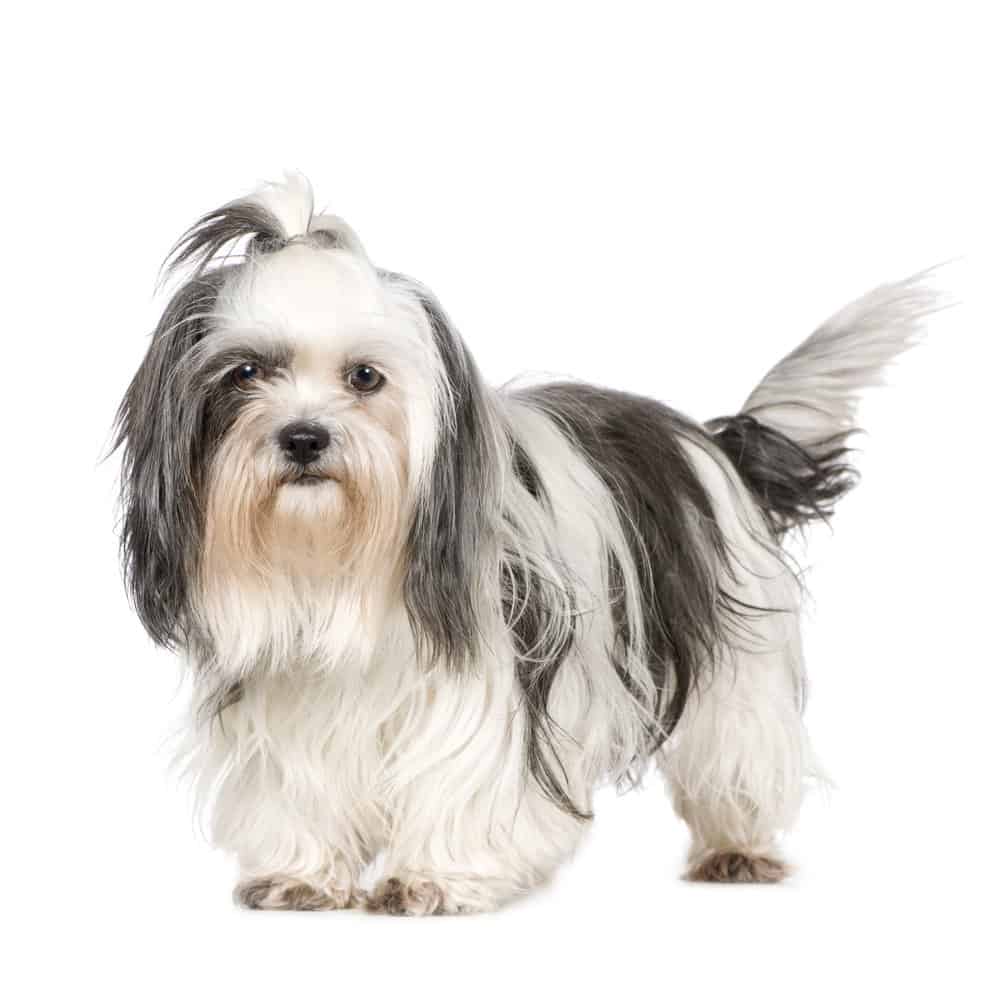
Potty training a small breed dog can be a bit more challenging than potty training a large breed dog.
©Eric Isselee/Shutterstock.com
Potty training a small breed dog can be a bit more challenging than potty training a large breed dog. This can be due to a variety of factors, but one of the most likely reasons is due to the fact that their bladder is much smaller than large dogs. Small dogs cannot hold as much urine in their bladder, causing them to have to urinate more often.
Another potential reason why it may be more challenging to potty train small breed dogs is due to the fact that since they pee in smaller amounts, pet parents may be more tolerant of accidents around their home. With both of these factors in mind, it’s clear that your shih tzu housebreaking needs to not only be consistent, but that you should always factor in multiple trips outside each day for them to do their business.
When you are consistent with your shih tzu’s potty training and cater to their unique housebreaking needs, most shih tzu dogs are fully housebroken within four to six months of their potty training being implemented. Many shih tzu dogs will excel at a faster rate, but it’s good to keep this timeframe in mind when welcoming a shih tzu puppy into your home.
When Should My Shih Tzu Be Spayed or Neutered?
If you do not want to breed your beloved shih tzu, then you may be interested in having them spayed or neutered once they are old enough. You may see varying information on the best time to sterilize your shih tzu, but according to research, it appears that between the age of six months-10 months is best.
This timeframe appears to be even more necessary for female shih tzu dogs, as their risk of reproductive cancer increases if they have not been spayed by the time they reach one year of age. We want the very best for your shih tzu’s individual needs, so we suggest speaking with your vet about what’s best for your pup.
When Will My Shi Tzu Start to Calm Down?
If you have a hyper shih tzu in your home, then you may be counting down the days until they finally calm down. So, when should you expect your rambunctious shih tzu to finally settle into adulthood and calm down?
In most cases, your little one should begin to calm down once they reach three to four years of age. Your shih tzu should still enjoy play time, but they should be more inclined to enjoy lazy days at your side at this point.
Common Medical Issues Seen in the Shih Tzu
Most shih tzu dogs will live a long and happy life of up to 15 years of age. But there are a few health complications they are more prone to experiencing. Every dog breed will have their own set of unique risks. We suggest being on the lookout for the symptoms we discuss below.
Breathing complications: The shih tzu has a much shorter snout than other dog breeds. This makes them more prone to breathing complications. This facial shape is referred to as brachycephalic airway syndrome. It increases the risk of everything from overheating to struggling with stamina during exercise. This is not something you can prevent. But we just suggest being aware of your dog’s limits with exercise and heat tolerance.
Eye conditions: The shih tzu breed experiences eye conditions at a much higher rate than other dog breeds. Many of these conditions can be managed when they are caught early. We suggest having them assessed by a vet if you ever see any changes in your dog’s eye appearance. This can include cloudy eyes, red eyes, eye swelling, eye discharge, and any other noticeable changes.
Patellar luxation: Patellar luxation refers to a condition in which the dog’s knee cap shifts during activity. Not only is this uncomfortable, but it can lead to joint disease if it is not managed properly. Some of the most common symptoms include a skip when the dog runs and an occasional limp.
Ear infections: Due to the breed’s floppy and fluffy ears, the shih tzu has a higher risk of ear infections. Some of the most common signs include head shaking, pawing at the ears, and ear odor. You may also notice ear discharge, ear crusting, and facial pain.
Pictures of Puppies
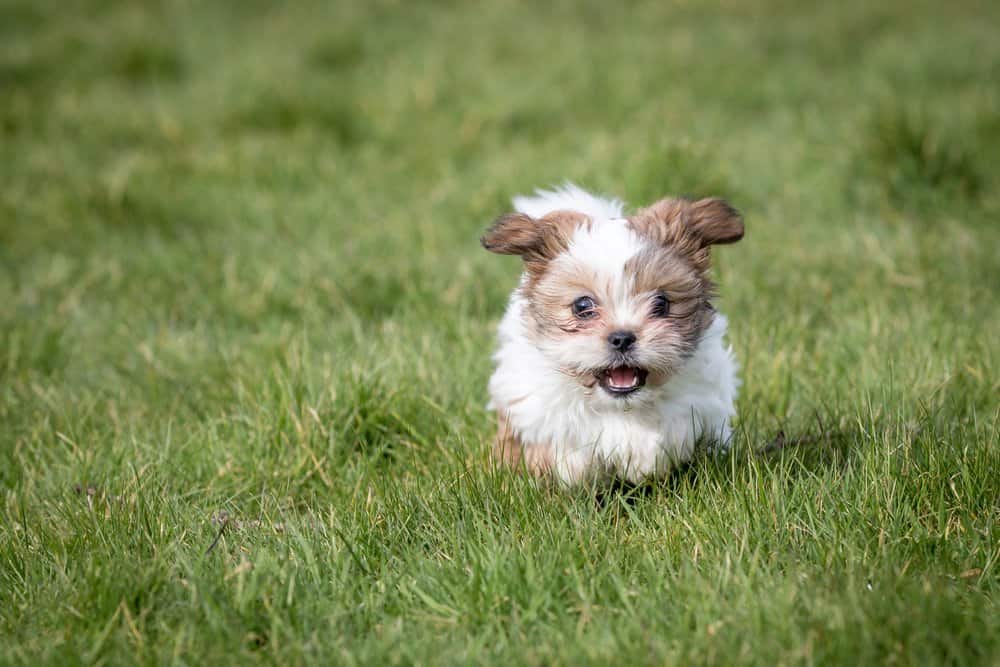
Shih Tzu puppies have lots of energy, like this one running through the grass.
©Daz Stock/Shutterstock.com

Shih tzu mix puppies are adorable!
©Eric Isselee/Shutterstock.com
Pictures Around 6 Months
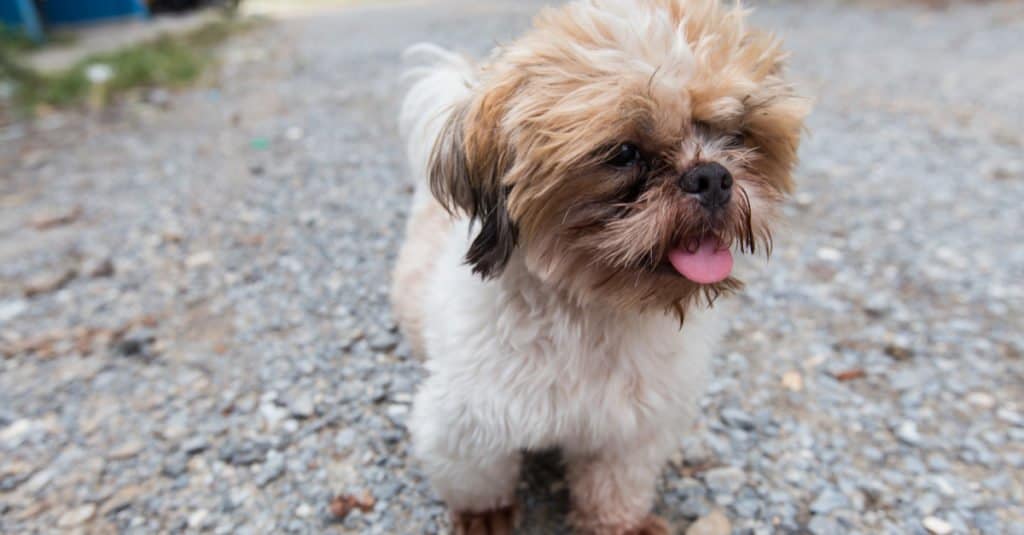
Shih tzus enjoy the outdoors with their owners.
©Rattiya Thongdumhyu/Shutterstock.com
Pictures of Adulthood
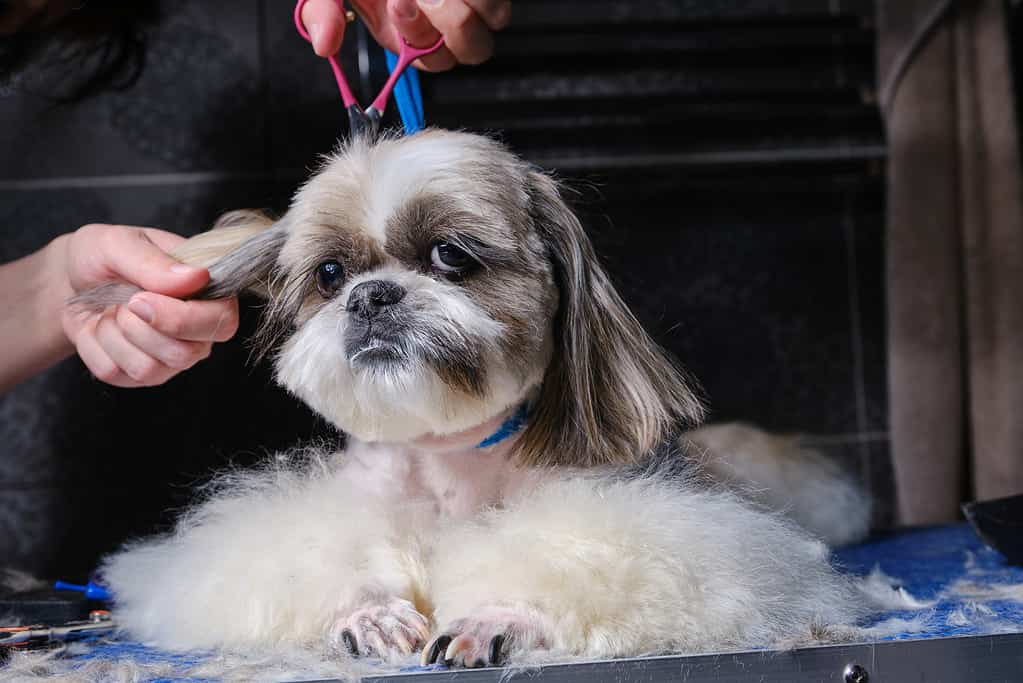
Shih tzus are calm adult dogs.
©iStock.com/Vlad Antonov

Shih tzus love to play into adulthood!
©rebeccaashworth/Shutterstock.com
As you can see, the shih tzu is a wonderful companion that possesses many lovable traits. They make wonderful companions for a variety of dog lovers, ranging from a single person home to a family home. Are you ready to welcome a lovable shih tzu into your family?
The photo featured at the top of this post is © Angel LeBlanc/Shutterstock.com
Ready to discover the top 10 cutest dog breeds in the entire world?
How about the fastest dogs, the largest dogs and those that are -- quite frankly -- just the kindest dogs on the planet? Each day, AZ Animals sends out lists just like this to our thousands of email subscribers. And the best part? It's FREE. Join today by entering your email below.
Thank you for reading! Have some feedback for us? Contact the AZ Animals editorial team.







